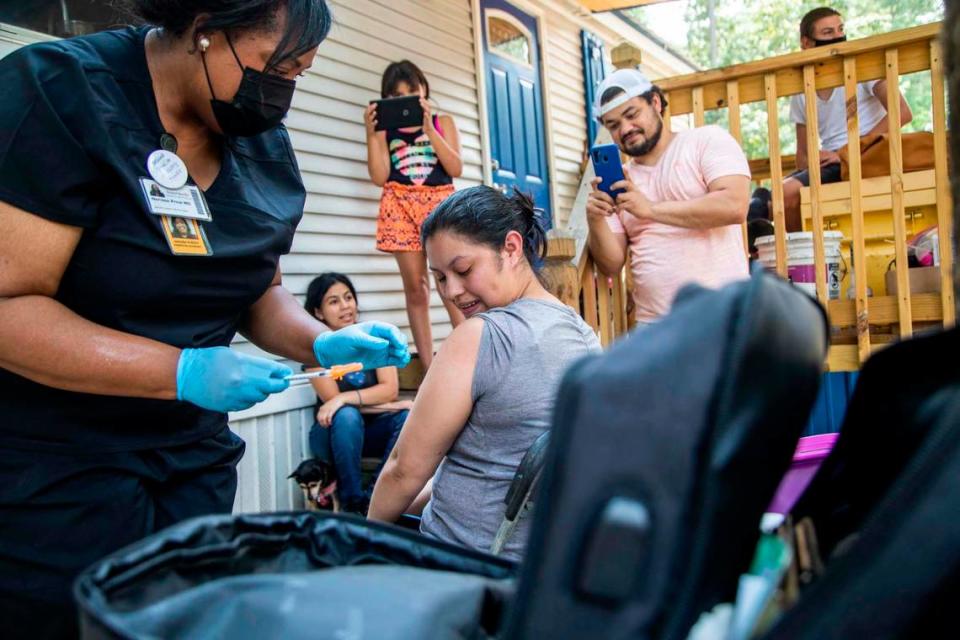‘People need access.’ Wake County goes door-to-door to offer COVID-19 vaccines.
Kovin Flores, who was unvaccinated before Friday, was worried about the rare potential side effects of the recently authorized COVID-19 vaccine.
“I wasn’t planning on getting it any time soon,” said Flores, 20.
But then Friday afternoon Wake County Public Health sent canvassers to Kings Parkway in east Raleigh where Flores lives. They knocked on his door and asked if he wanted the vaccine.
“I had the opportunity, so I got it,” Flores said.
And since the side effects weren’t as bad as he thought, he said he was going to tell his friends to get the vaccine also.
“It wasn’t that bad,” Flores said. “They shouldn’t be worried.”
His 12-year-old sister Kelsey Flores got the vaccine, too, the youngest eligible age currently for the vaccine.
The Floreses weren’t the last.
As of 2:30 p.m. Friday, six of Flores’ neighbors agreed to get the vaccine as well.
It’s a part of a Wake County initiative where health workers go door-to-door in neighborhoods with low vaccination rates, typically areas with rates from 30% to 40%.
It’s low compared to the county rate. As of Friday, around 70% of those eligible had received at least one dose of the vaccine in Wake County, according to county officials.
“That’s a pretty big difference,” said Dr. Nerissa Price, medical director of WakeMed Physician Practices Well-Being Initiatives.
She administered the vaccines to the Floreses.
“What we have been concerned about is seeing the vaccination rate go down and down and we assume that meant that people weren’t interested anymore, but it’s not true,” Price said. “People just need access.”
David Flores, Kovin and Kelsey’s dad, said this access allowed his children to easily get vaccinated.
“We got an opportunity today to help the community,” he said.
David Flores, 48, survived COVID-19 last year and got vaccinated earlier this year.
“You think your life is gone [when you have the disease]. That’s why I tell people to get the vaccine, because it’s very important,” he said.
How vaccine canvass works
Wake County is using census tract data to identify neighborhoods with low vaccination rates, then sending canvassers who go door-to-door to ask people if they want to get the vaccine.
They offer first and second doses of the Pfizer vaccine.
If the person agrees to a first dose, the team will schedule their next shot in three weeks.
They can either schedule an appointment at one of the county’s vaccine sites, or the canvass team will arrange to go back to the person’s home.
As the canvass team goes door-to-door, they’ll also answer any questions residents may have.
“Some of the doors never open. Other doors, when they do open, they still have a lot of hesitancy and concern, but they’re willing to have that conversation with us,” Price said. “My hope is, if we keep coming back, and they see our commitment, and they see that we as health care providers are assuring them of the safety of the vaccine and how it’s all going to help us get to a safer, normal life, I think that maybe we’ll get some of those folks.”
Lwiza Garcia Escobar, Wake County Community Engagement Specialist, said that the county will continue to canvass indefinitely.
“We’re going to keep coming to neighborhoods with low vaccination rates who may be open to this,” Escobar said.
Why are people waiting?
Price said people she has talked to while canvassing have given her multiple reasons for not being vaccinated.
Some elderly people have issues with transportation, she said, and others with children have problems making the time. They aren’t necessarily hesitant, she said.
“All we needed to do was to knock on doors, and they would open those doors and say, ‘I want the shot.’ That’s wonderful news. We can help with that,” Price said.
Black and Hispanic North Carolinians are disproportionately unvaccinated compared to other groups.
Price, who is Black and is from the ZIP code she was canvassing Friday, said some people need to see a familiar face.
“Sometimes it’s not the message, but the messenger,” she said. “It’s amazing how quickly people change their attitude when they see your face.”
Others, especially younger people, Price said, are worried about the delta variant, a more transmissible form of the coronavirus that is spreading rapidly among people who have not been vaccinated, according to recent data from the N.C. Department of Health and Human Services.
“I am concerned that this could be a road we do not want to go down again,” Price said of the delta variant. “That’s why it’s so important to get the message out, to find solutions to barriers and to get shots in arms.”



